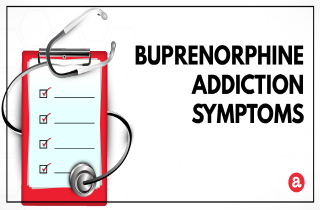Signs of addiction to buprenorphine may not be easy to identify. But in order to help yourself or someone you love who’s experiencing problems with buprenorphine, we’ve outlined some common signs of buprenorphine addiction. How can you recognize buprenorphine addiction and what can you to about it? We review here. Then, we invite your questions about buprenorphine abuse or treatment for buprenorphine addiction at the end.
Buprenorphine addiction signs
Buprenorphine was approved for the treatment of addiction to illicit and prescription drugs such as heroin, hydrocodone, OxyContin, oxycodone morphine, and codeine. At low medicinal doses, buprenorphine produces an agonist effect on the central nervous system to help drug users discontinue opiates/opioids without experiencing withdrawal symptoms. But buprenorphine (mostly prescribed in the form of Suboxone) can be abused. The most common routes of buprenorphine abuse include snorting – during which users crush Suboxone tablets and snort the white powder – OR binge oral use of Suboxone – during which users continually take more buprenorphine than prescribed. Sublingual buprenorphine has moderate bio availability compared to snorted buprenorphine and usually does not produce euphoric effect.
Buprenorphine can cause physical and psychological dependence which contribute to addiction. Over time, users can increase buprenorphine doses without considering a doctor’s opinion, and might also prolong their use. Even though doctors tend to monitor the administration of prescribed buprenorphine and try to avoid the risk of physical dependency, eventually the body will get used to the presence of buprenorphine. Furthermore, users can develop tolerance, the need increase drug dosage or frequency in order to achieve initial therapeutic effect. But are these signs of addiction?
Symptoms of buprenorphine addiction
Buprenorphine users do not usually get addicted to buprenorphine over night. Addiction to buprenorphine can develop gradually. In fact, addiction to buprenorphine is progressive condition that may not develop easily noticeable symptoms right away. Since buprenorphine is used to help other opioids addicts, it is often possible to confuse the signs of physical addiction to opioids with addiction to buprenorphine. Possible symptoms of buprenorphine addiction include:
- abnormal responses to stress
- apathetic mood
- continued use of buprenorphine despite negative outcomes
- depression
- diarrhea
- drowsiness
- fever
- hair loss
- inability to control the compulsive use of buprenorphine
- inability to deal with emotions
- increased blood pressure
- insomnia
- loss of interest in sex
- muscle pain and cramps
- nausea
- poor memory
- preoccupation with obtaining or consuming buprenorphine
- slurred speech
- small pupils
- strong cravings can’t be soothed
- sweating
- vomiting
- watery eyes
Even though buprenorphine is not as dangerous as other narcotics, the FDA treats buprenorphine as a controlled narcotic substance. This is why buprenorphine is not recommended to be administered by people with depression or psychological distress. However, buprenorphine addiction is DIFFERENT THAN dependence on the drug. Buprenorphine withdrawal symptoms manifest when doses are significantly lower than usual or nonexistent. Symptoms like agitation, headaches, nausea and sweating indicate dependence but not addiction. Even with regular use of buprenorphine, following a prescription schedule, withdrawal symptoms can occur. The difference might be in severity: when it comes to chronic abuse, withdrawal symptoms can be quite severe.
Buprenorphine addiction symptoms: Can they be treated?
Yes, buprenorphine addiction symptoms can be treated, and chances for prolonged abstinence and healthy future exist for any addict. But buprenorphine addiction symptoms are not always easy to identify. In fact, the main signs of any addiction are usually psychological in nature. They include:
1. Inability to control drug use (dosage, frequency, mode of administration)
2. Inability to stop using drug or stay stopped
3. Intense drug craving, compulsion, or obsession to use the drug
4. Negative life consequences
Help for buprenorphine addiction is most successful when a program is individualized to the needs of the addicted person. A personalized combination of medical and psychological support can help treat buprenorphine addiction. Very often, addicts know deep inside that they really need to get help, but the first step of breaking the cycle of use can be really hard to take. This is why support groups, family therapy, individual behavioral/psychotherapy can help are most effective. In developing awareness of triggers, cravings, and the addiction cycle, an addict can learn how to cope with the psychological urge for buprenorphine and/or adapt new positive attitudes and habits. Experts recommend a combined approach to addiction which combines behavioral, pharmacological and psychological treatments. While outpatient treatment can be effective for those motivated to change, inpatient rehab can help those who need a change of environment to get clean.
Signs of buprenorphine addiction questions
If you have a question related to the signs and symptoms of buprenorphine addiction, we will be glad to provide you with personal and prompt answer. All you need to do is post your question in the following section.









Related Posts